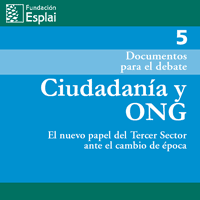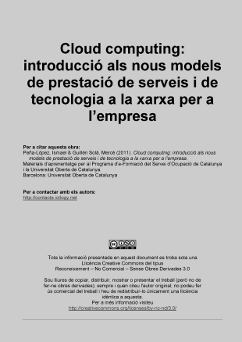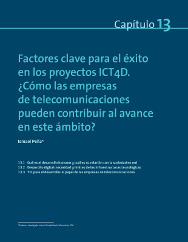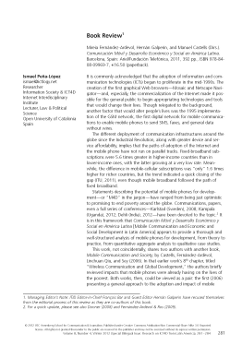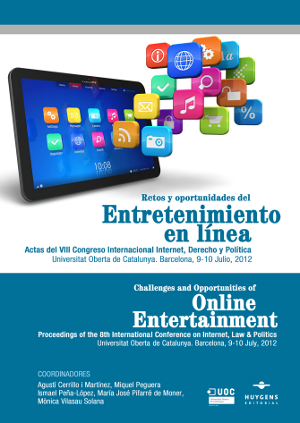20130417
By Ismael Peña-López
Main categories: News, Nonprofits, Writings
Other tags: heavy_switching | John_Moravec | on_the_horizon | ple | translearning
No Comments »
After a long collaborative process of several months, the book Ciudadania y ONG (Citizenry and Nonprofits) has just seen the light. This has been a very interesting exercise of co-coordination along with Imanol Zubero, Carlos Giménez and Enrique Arnanz.
For the making of the book, the website CiudadaniayONG.org was used in two steps:
- A delimited survey open to everyone, to copse the main topics around the three axes that we had predefined:
intergenerational relationships, transforming participation, and digital citizenry.
- An open forum, where the main conclusions of the survey were discussed and complemented with many insights.
In each step documents were produced to provide the appropriate context for the coming reflection.
Besides being part of the whole process, I concentrated in the third axis, that is, digital citizenry, and what did it mean for participation, volunteering and nonprofits in general entering the new era of the Information Society.
I am deeply grateful to the promoters of the book, Fundación Esplai, and, of course, to the rest of the coordinators. Scholars have fewer occasions to collaborate with people outside the Academia and higher pressure not to: being part of the book was keeping a wire attached to the power that boosts citizen movements. Besides the later, some of the many people that helped in making the book a reality are Carles Barba, María Jesús, José Maria Pérez, Maria Jesús Manovel, Elvira Aliaga, Virginia Pareja, Cesk Gasulla, Josechu Ferreras, Jorge Hermida, Carles Campuzano, Luis M. López Aranguren, Consuelo Crespo and Rafael Rodríguez.
The book has been published in Spanish and translated into Catalan.
Downloads:
20130319
By Ismael Peña-López
Main categories: Education & e-Learning, News, Writings
Other tags: heavy_switching | John_Moravec | on_the_horizon | ple | translearning
2 Comments »
On the Horizon — the academic journal on education policy and strategic planning — has just published has just published a special issue on the Knowmad Society and borderless work and eduction.
The issue includes a paper of mine entitled Heavy switchers in translearning: from formal teaching to ubiquitous learning, which is quite a title indeed.
The nonwords I use in the title, more than gratuitous, really want to point at some crucial points I address in the paper:
- Heavy switching is opposed to multitasking, in the sense that not only people do not actually multitask (increasing scientific evidence on that matter) but actually switch tasks very quickly and, more important, switch environments: their (formal) learning environment, their job environment, their family environment… When your environment is where your laptop is, people really can and actually do switch tasks quite heavily.
- Translearning is about learning through (instead of at) several places, learning as one goes along different environments and, above all, learning resources, especially those that are found outside of educational institutions.
Thus, heavy switching and translearning are used in the sense that ICTs do transform the context and the environment where learning usually took place. And that is why Vygotsky’s Zone of Proximal Development is revisited, this time to redefine the more knowledgeable other in the framework of Personal Learning Environments.
In his introductory article to the special issue, guest editor John W. Moravec describes the article as:
an interesting approach in blending Vygotsky’s zone of proximal development (ZPD) (see esp. Vygotsky 1978) with personal learning environments (PLEs), afforded through ICTs, that enable translearning and heavy switching that is difficult to manage in formal learning environments. In other words, PLE-based learning strategies could be employed to manage an individual’s engagement within their own ZPD. Such an approach, [the author] argues, blurs the distinctions between teachers and learners, in addition to questioning the roles of formal institutions of learning.
The paper is still in its preprint version, so it may still go under some minor edits.
I am very glad to see this paper published as its conception has been a gradual process of putting scattered ideas together since, as far as I can remember, my reflections after the Open EdTech Summit in November 2010. Most of them were tested live at TIES2012 in my communication The PLE as a �personal tool for �the researcher and the teacher.
I am very grateful to John W. Moravec for his infinite patience, comments and hints way beyond his duties as guest editor.
Download
Abstract
Purpose – We explore the role of Personal Learning Environments in an already ICT-dense context and in combination with some educational approaches in the field of technology enhanced education. We analyze how Personal Learning Environments are not a device but a learning strategy that threatens the way educational institutions and their functions are understood, by contributing to enable a borderless learning society.
Design/methodology/approach – We will begin revisiting Vygotsky’s concept of the Zone of Proximal Development and assess the role of educators and educational institutions as the actual more knowledgeable others in scaffolding learners’ learning paths. This role will be put in relationship with different learning scenarios (formal, non-formal, informal and autodidactic) according to their inner structure (or lack of) and degree (or absence) of planning. Last, we put PLEs in relationship with other “physical” spaces (VLEs and LMSs), the digitization of content (open educational resources), records and assessments (e-Portfolios) and the possibility to flip some traditional tasks or processes that enabled regaining the social component in the classroom (Education 2.0).
Findings – We suggest that PLEs have come to close the circle of ICTs in Education with a highly transformative power: the power to blur the boundaries between formal teaching and informal learning. Indeed, the traditionally difficult transition from one learning scenario to a different one has been made smoother by the appearance of OER and, especially, social media constructs that can be used for learning purposes, especially within a PLE-based strategy.
Originality/value – It is stated that institutions should embrace and even foster the possibility that learners could easily and intensively switch educational resources, just like they could shift among different registers and learning scenarios, as a newly enabled way to tear down the artificial divisions that formal learning edified.
Bibliography
Kalz, M. (2005). “
Building Eclectic Personal Learning Landscapes with Open Source Tools”. In de Vries, F., Attwell, G., Elferink, R. & Tödt, A. (Eds.),
Open Source for Education in Europe. Research & Practise, 163-168. Conference proceedings. Heerlen, the Netherlands, November 14 and 15, 2005. Heerlen: Open University of the Netherlands.
Peña-López, I. (2009). “
The personal research portal”. In Hatzipanagos, S. & Warburton, S. (Eds.),
Handbook of Research on Social Software and Developing Community Ontologies, Chapter XXVI, 400-414. Hershey: IGI Global.
Roberts, G., Aalderink, W., Cook, J., Feijen, M., Harvey, J., Lee, S. & Wade, V.P. (2005).
Reflective learning, future thinking: digital repositories, e-portfolios, informal learning and ubiquitous computing. Briefings from the ALT/SURF/ILTA Spring Conference Research Seminar. Dublin: Trinity College.
Rossi, P.G., Pascucci, G., Giannandrea, L. & Paciaroni, M. (2006). “
L’e-Portfolio Come Strumento per la Costruzione dell’Identità”. In
Informations, Savoirs, Décisions, Médiations, (25), art.348. La Garde: Université du Sud Toulon-Var.
Smith, M.K. (2008). “
Informal learning”. In
the encyclopaedia of informal education. London: YMCA George Williams College, London.
20130110
By Ismael Peña-López
Main categories: Education & e-Learning, Hardware, News, Participation, Engagement, Use, Activism, Writings
Other tags: business_school | cloud_computing | merce_guillen | oer | soc | social_networking_sites | uoc
1 Comment »
During the last two academic courses I have made some collaborations with the Open University of Catalonia’s Business School and the joint project in e-training for unemployed people between this university and the Catalan Employment Service.
I was asked — in both cases — to author some learning materials on Cloud Computing and Social Networking Sites. The target of the courses were micro-entrepreneurs in the former case and unemployed people in the later. Thus, those would be very short courses (usually 4 or 5 weeks long), that required very short time spans (people are busy running their businesses or looking for a job) and with special emphasis that they had to be really practical, avoiding theoretical digressions. In other words: useful courses for partial-time (even casual) learners.
I here present the materials that Mercè Guillén and I penned together. There are a total of 4 learning materials that we are free to share as open educational resources under a CC BY-NC-ND license. The courses are as follows:
- Social networking sites for unemployed people, in Catalan.
- Cloud computing for unemployed people, in Catalan.
- Cloud computing for micro-entrepreneurs, in Catalan.
- Cloud computing for micro-entrepreneurs, in Spanish.
For those interested, you will see that while the Cloud Computing courses share some content, their approach is quite different, the second one (for micro-entrepreneurs) following the usual design of a (fictional) case-study.
Downloads:
Mercè Guillén Solà, Ismael Peña-López (2011).
“
Xarxes socials i professionals a l’empresa“. Materials d’aprenentatge per al Programa d’e-Formació del Servei d’Ocupació de Catalunya i la Universitat Oberta de Catalunya. Barcelona: Universitat Oberta de Catalunya.
Ismael Peña-López, Mercè Guillén Solà (2012).
“
Informàtica en núvol“. Materials d’aprenentatge per al Programa de Gestió i Direcció de Microempreses de la Business School de la Universitat Oberta de Catalunya. Barcelona: Universitat Oberta de Catalunya.
Ismael Peña-López, Mercè Guillén Solà (2012).
“
Computación en la nube“. Materiales de aprendizaje para el Programa de Gestión y Dirección de Microempresas de la Business School de la Universitat Oberta de Catalunya. Barcelona: Universitat Oberta de Catalunya.
20121228
By Ismael Peña-López
Main categories: ICT4D, News
Other tags: beatriz_sanz | esade | manuel_acevedo | mar_cordobes | mireia_fernandez-ardevol | sonia_navarro | vanessa_frias-martinez
No Comments »
ESADE‘s Institute for Social Innovation has just published a new book authored by Mar Cordobés and Beatriz Sanz, and coordinated by Sonia Navarro: TIC, desarrollo y negocios inclusivos [ICT, inclusive development and businesses].
The book deals about Information and Communication Technologies for Development (ICT4D) but, provided that ESADE is a business school, the approach heavily relies on the role of businesses in achieving this development through ICTs.
The book begins with two initial chapters on ICTs in social inclusion and the role of global businesses in development under the approach of “inclusive markets”. The second part of the book is made up by an analysis of several cases in the field of e-commerce, e-agriculture, learning and training, e-health, e-governance or online volunteering, to name a few.
Part III devotes three chapters to the conclusions and advice for policy-makers, being Part IV four more chapters written by invited contributors (amongst them, yours truly):
- Manuel Acevedo: ICT and human development in Latin America.
- Mireia Fernández-Ardèvol: Mobile communication and social development in Latin America.
- Ismael Peña-López: Key factors for successful ICT4D projects: How can telecoms contribute.
- Vanessa Frías-Martínez: Mobile phones and emergent markets in Latin America.
In what concerns my book chapter, Key factors for successful ICT4D projects: How can telecommunication businesses contribute to the advancement in ICT4D, I begin speaking about general concepts like development, the Information Society and their relationship. I go on stating that digital infrastructures do not necessarily lead to social development, being them “only” a necessary but not sufficient condition that goes in parallel with other important aspects such as a powerful industry, digital literacy, a regulatory framework, or a wide supply of digital content and services.
I end up listing what I think are the three main roles for telecoms in ICT4D:
- To lower down the “last” barriers of access in what refers to infrastructures: usability, accessibility and affordability.
- Once physical access is no more an issue, to work for utility, capacity and e-awareness. That is, to raise awareness not only on what can ICTs can be used for, but on how they are transforming our lives and creating new arrays of exclusion for those that do not skilfully use them.
- Last, but not least, to mind the context: ICTs are a tool and, as such, they multiply the reality they are used in. In this sense, it is very important to remind that ICTs stand for “information” and “communication” technologies, and thus the knowledge gap is a hypothesis that is increasingly been backed up with evidence.
Download the chapter:
Download the full book:
Download from the official website.
Alternate download:
20121213
By Ismael Peña-López
Main categories: ICT4D, News
Other tags: m4d
No Comments »
Information Technologies & International Development journal has just published its Vol 8, Issue 4 Winter 2012, a special bilingual issue featuring research on ICT4D from Latin America.
This issue features a piece written by me, the book review of Comunicación móvil y desarrollo económico y social en América Latina [Mobile communication and economic and social development in Latin America], by Mireia Fernández-Ardèvol, Hernán Galperin and Manuel Castells. As a bilingual issue, my book review has both been published in English and Spanish: please follow the links below to download the reviews.
It is worth reminding that, back in September 2011, Manuel Castells offered a presentation of the book which I attended. My notes can be read at Mobile communication and economic and social development in Latin America.
20120710
By Ismael Peña-López
Main categories: Cyberlaw, governance, rights, e-Government, e-Administration, Politics, Information Society, Meetings, News
Other tags: idp | idp2012
No Comments »
The proceedings of the 8th International Conference on Internet, Law & Politics (IDP 2012): Challenges and Opportunities of Online Entertainment. will be free for download in the following days on this page.
Content, besides some minor editing, has followed the originals, so the reader will find both articles in Spanish or English.
To cite this works use, please, any of the following references:
Cerrillo i Martínez, A., Peguera, M., Peña-López, I., Pifarré de Moner, M.J., & Vilasau Solana, M. (coords.) (2012). Retos y oportunidades del entretenimiento en línea. Actas del VIII Congreso Internacional, Internet, Derecho y Política. Universitat Oberta de Catalunya, Barcelona 9-10 Julio, 2012. Barcelona: UOC-Huygens Editorial.
Cerrillo i Martínez, A., Peguera, M., Peña-López, I., Pifarré de Moner, M.J., & Vilasau Solana, M. (coords.) (2012). Challenges and Opportunities of Online Entertainment. Proceedings of the 8th International Conference on Internet, Law & Politics. Universitat Oberta de Catalunya, Barcelona 9-10 July, 2012. Barcelona: UOC-Huygens Editorial.
8th Internet, Law and Politics Conference (2012)
